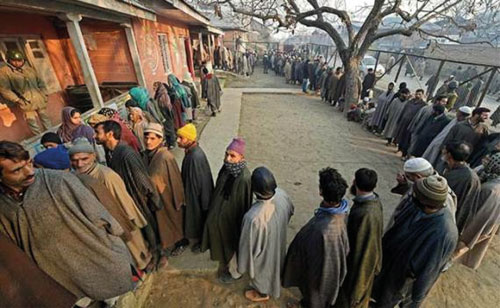Umer Maqbool
Srinagar: In a controversial move, the delimitation commission constituted by the Narendra Modi gov-ernment has proposed six additional assembly seats for the Jammu region and only one more seat for Kashmir, triggering widespread criticism from ma-jor political forces in the union territory.
Many view the recommendation as an “assault on political centrality and supremacy” of Kashmir in J&K’s politics and “part of the series of measures started by BJP-led government from August 5, 2019 to disempower Kashmiris”. The proposal has raised eyebrows as the population living in the Kashmir Valley is 15 lakh more than Jammu, as per the last census exercise.
Delimitation in J&K has been on the BJP’s agenda since 1995, when the last such exercise was carried out in the erstwhile state.
Draft proposal In its meeting held in New Delhi on Monday (December 20), the commission, consti-tuted by the Union government on March 6, 2020 to redraw the electoral map of J&K, told its associate members – three MPs from the National Conference and two from the BJP – that it has proposed six additional seats for Jammu and one for Kashmir.
“The commission has proposed six seats for Jammu and only one for Kashmir,” Justice (retired) Hasnain Masoodi, the NC MP from Anantnag and associate member of the panel, told The Wire.
He said the commission has asked them (MPs) to respond to the proposal by December 31. “This proposal is unacceptable to us as Kashmir deserves more seats than Jammu as per population,” he said.
The proposal would take the number of assem-bly seats in Jammu to 43 from existing the 37, and to 47 in Kashmir from 46.
The Wire has learnt that the panel has proposed to increase one seat each in Kathua, Samba, Ud-hampur, Doda, Kishtwar and Rajouri districts in the Jammu region and Kupwara in the Kashmir Valley.
The Kathua, Samba and Udhampur segments will be Hindu-majority constituencies. As per cen-sus figures, Kathua has an 87.61% Hindu popula-tion, while Samba and Udhampur have 86.33% and 88.12% population from the community. Kishtwar, Doda and Rajouri districts too have also sizeable Hindu population (between 34% and 45%).
Delimitation in J&K has been a longstanding plan for the BJP, and the party has often raised the bogey of underrepresentation of the Jammu region. The party won 25 seats in the area in the 2014 as-sembly polls, and went on to became part of the government for the first time in history.
The right-wing party’s oft-repeated claims of underrepresentation of the Jammu region in J&K assembly don’t withstand scrutiny. The region had got a better deal than Kashmir in the last delimita-tion exercise too.
In 1995, Kashmir was allocated 46 seats and Jammu 37. This means that Kashmir, which ac-counts for 56.15% of the population of J&K, had 55.42% representation in the assembly and Jammu, where 43.84% of the population of the region re-sides, had 44.57% representation.
Besides this, the increase in number of seats in the Jammu region from 1957 is more than double that of Kashmir. While Kashmir saw an overall increase of three seats, Jammu’s seat tally has gone up by seven. In the first assembly election held in 1957, 43 seats were allocated to the Kashmir Val-ley, 30 to Jammu and two to Ladakh, which is no longer part of J&K after the reorganisation of the erstwhile state.
People in the Kashmir Valley believe that pro-posal of the delimitation exercise is part of the BJP’s “dream project” of installing a Hindu chief minister in the Muslim-majority J&K.
A Muslim has always been the head of the elected government in J&K since 1947. All chief minister of J&K, except Ghulam Nabi Azad, have been residents of the Kashmir Valley.
Widespread criticism The new proposal has evoked widespread criticism in the Kashmir Valley, with political leaders alleging that the recommenda-tion reeks of a partisan approach by the commission.
“The draft recommendation of the J&K delimi-tation commission is unacceptable. The distribution of newly created assembly constituencies with 6 going to Jammu & only 1 to Kashmir is not justified by the data of the 2011 census,” former chief minis-ter and NC vice-president Omar Abdullah tweeted.
Former chief minister and People’s Democratic Party president Mehbooba Mufti said “the real game plan is to install a government in J&K which will legitimise the illegal & unconstitutional decisions of August 2019”.
“My apprehensions about the Delimitation Commission werent misplaced. They want to pitch people against each other by ignoring the population census & preposing 6 seats for one region & only one for Kashmir,” she said.
People’s Conference chairman Sajad Gani Lone said the proposal “reeks of a bias” and is a “shock to those who believe in democracy in Kashmir”. “The recommendations of the delimitation commission are totally unacceptable. They reek of bias. What a shock for those who believe in democracy,” Lone tweeted.
Districts classified into three categories: delimitation commission In a handout issued this evening, the delimitation commission headed by former Supreme Court judge, Justice (retired) Ranjana Desai said it has shared the proposed seat allocation at the level of districts with all the members with the request to furnish their views/comments/suggestions by December 31.
The panel said it has categorised all 20 districts in three broad categories giving margin of +/- 10% of average population per assembly constituency, while proposing allocation of the constituencies to the districts.
—Courtesy The Wire










